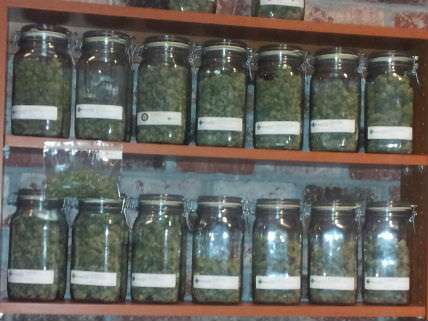What's in Colorado's New Marijuana Laws

Yesterday the Colorado General Assembly gave final approval to legislation aimed at implementing Amendment 64, the marijuana legalization initiative enacted by that state's voters last November. H.B. 1317 establishes a framework for regulating the state-licensed pot stores that are supposed to start opening next year, while H.B. 1318 imposes a 15 percent excise tax and a 10 percent special sales tax on marijuana. The Colorado Department of Revenue now has until July 1 to write detailed regulations, while the new taxes must be approved by voters this fall before they can take effect.
The final version of H.B. 1317 includes a ban on the distribution of marijuana by collectives organized as nonprofit corporations, a provision aimed at operations like MJ Proper, a 501(c)(3) organization that delivers marijuana buds and marijuana-infused beer to its members. Under Amendment 64, people would still be free to grow up to six plants and transfer up to an ounce at a time "without remuneration." On its face, the new provision would not stop home growers from pooling their resources and their six-plant quotas; they just could not distribute marijuana through "a sole proprietorship, corporation, or other business enterprise" without obtaining a state license.
Other major provisions of H.B. 1317 that I have noted before include:
- Marijuana stores must obtain local as well as state approval.
- Owners of marijuana stores must be Colorado residents.
- Current medical marijuana centers get a three-month head start in the licensing process.
- Marijuana stores must grow at least 70 percent of what they sell until October 1, 2014.
- Marijuana stores may not engage in "mass-market campaigns that have a high likelihood of reaching minors."
- Marijuana-oriented magazines must be kept behind the counter in stores that are open to people younger than 21.
- Marijuana products must be sold in tamper-resistant packages listing THC content.
- Pot stores may not sell snacks, drinks, alcohol, or tobacco.
- On-site consumption of marijuana will not be permitted.
- Visitors from other states may buy no more than a quarter of an ounce at a time.
This week the Colorado legislature also approved a separate bill, H.B. 1325, that allows convictions for driving under the infuence of a drug (DUID) based on nothing more than a THC blood level of five nanograms per milliliter, a standard that exposes many regular smokers to legal hazards even when they are not impaired.


Show Comments (36)